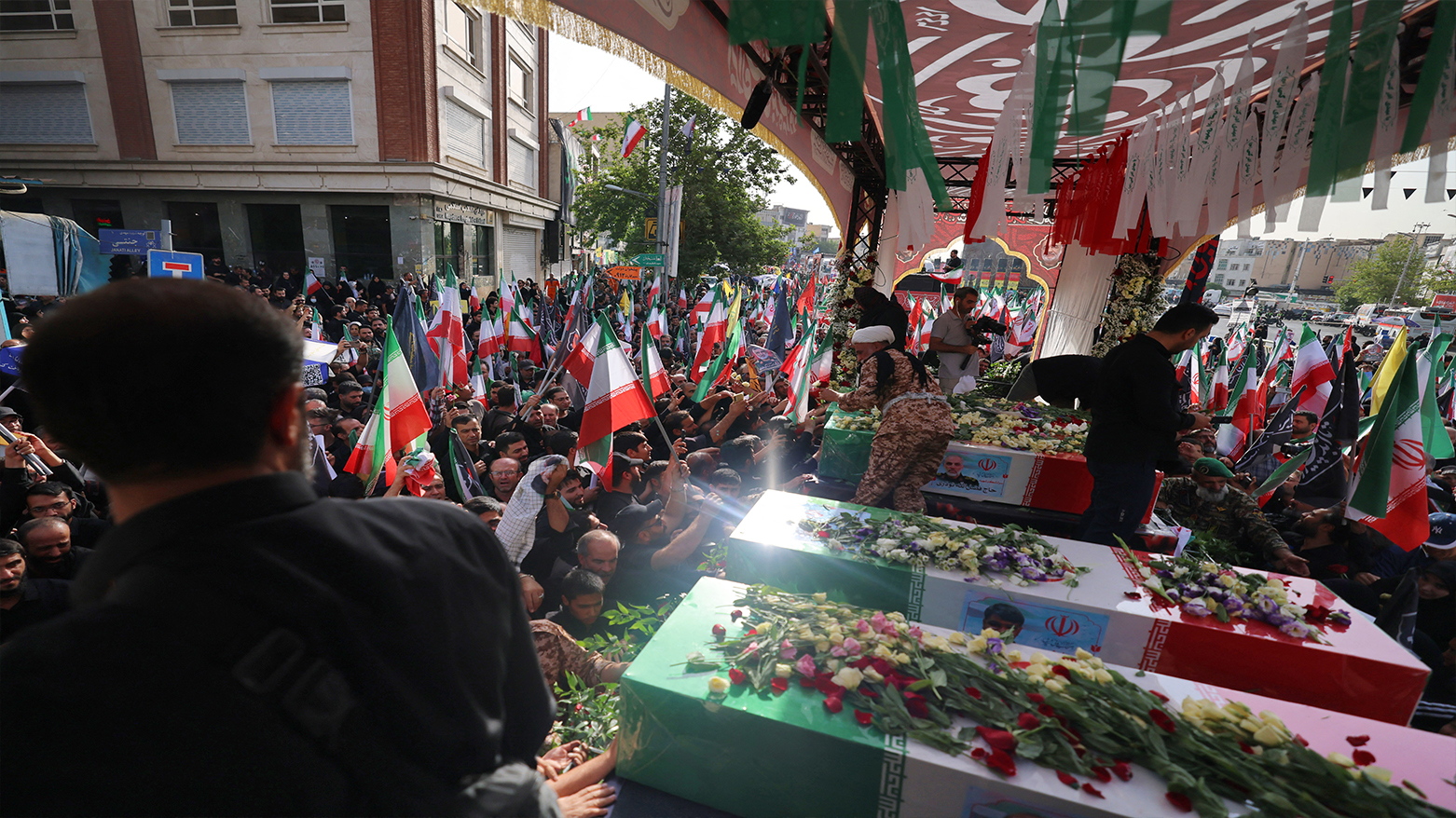Iran Holds State Funeral for Military Commanders Killed in War with Israel
Iran holds state funeral for 60 military & nuclear officials killed in Israel war amid Trump-Khamenei spat. Tehran condemns Trump's 'disrespectful' remarks while Israel claims nuclear program setback. Both sides claim victory as fragile ceasefire holds.

By Ahora Qadi
ERBIL (Kurdistan24) – Iran held a state funeral on Saturday in Tehran for dozens of high-ranking military officers and nuclear scientists killed in its recent war with Israel, amid heightened tensions following remarks from US President Donald Trump, which Iranian officials condemned as disrespectful and inflammatory.
The ceremony, which began at 8:00 a.m. local time in the capital, was attended by Iranian President Masoud Pezeshkian and senior government officials. Government offices and many businesses closed for the occasion as mourners gathered to honor approximately 60 individuals, including several top military commanders and nuclear scientists.
A ‘historic’ farewell to Iran’s fallen elite
Coffins draped in Iranian flags and adorned with portraits of the deceased were carried through Enghelab Square in central Tehran. State television broadcast images of mourners dressed in black, waving Iranian flags and holding aloft pictures of slain commanders.
Mohsen Mahmoudi, head of Tehran's Islamic Development Coordination Council, described the day as “historic” for the Islamic Republic and the revolution. The ceremony was followed by a funeral procession to Azadi Square, stretching across the capital.
Among those buried were Major General Mohammad Bagheri, the second-in-command of Iran’s armed forces, along with his wife and daughter, a journalist. Also laid to rest were Revolutionary Guards commander Hossein Salami, killed on the first day of the conflict, and nuclear scientist Mohammad Mehdi Tehranchi, who was buried alongside his wife. Four children were among the dead.

Iran condemns Trump’s remarks on Khamenei
The funeral coincided with a diplomatic uproar sparked by Donald Trump’s comments on Iran’s Supreme Leader Ayatollah Ali Khamenei. In a Truth Social post, the US president claimed he had “saved” Khamenei from an “ugly and ignominious death” during the war and had halted sanctions relief due to Iran’s “statements of anger, hatred, and disgust.”
Trump claimed he had known “EXACTLY where [Khamenei] was sheltered,” and that both Israel and US forces were prepared to strike, but he personally intervened to prevent the assassination.
Iran’s Foreign Minister Abbas Araghchi responded sharply on Saturday, calling Trump’s remarks “unacceptable” and “disrespectful.” In a post on X, Araghchi warned, “If President Trump is genuine about wanting a deal, he should put aside the disrespectful and unacceptable tone towards Iran’s Supreme Leader, Grand Ayatollah Khamenei.”
He added that the Iranian people, who “showed the world that the Israeli regime had NO CHOICE but to RUN to ‘Daddy’ to avoid being flattened by our Missiles,” would not tolerate threats or insults.
US and Israeli strikes, Iranian retaliation
The funeral followed a devastating 12-day war that erupted on June 13 after Israel, later joined by the United States, launched coordinated strikes on three Iranian nuclear sites, aiming to dismantle Tehran’s nuclear infrastructure.
Israel claimed to have killed more than 30 senior Iranian security officials and 11 top nuclear scientists, and asserted the strikes neutralized Iran’s ability to enrich uranium to weapons-grade levels.
Iran retaliated with missile barrages on Israeli military targets and cities. Tehran’s health ministry reported 627 deaths, while Israel said 28 people were killed on its side.
Conflicting narratives over nuclear capability
Both nations claimed victory following the US-brokered ceasefire. Iranian leader Khamenei downplayed the damage from US airstrikes, while Israel asserted it had “thwarted Iran’s nuclear project.”
Israeli Foreign Minister Gideon Saar reiterated Friday that the global community must prevent Iran from developing an atomic bomb. “The international community now has an obligation to prevent, through any effective means, the world's most extreme regime from obtaining the most dangerous weapon,” Saar posted on X.
Tehran, which insists its nuclear program is strictly civilian, rejected US claims that its capabilities had been set back by decades. Khamenei accused Trump of “exaggerating events in unusual ways.”
Diplomatic uncertainty and calls for restraint
During the war, Trump revealed he had been preparing to lift sanctions and resume negotiations. He said those plans were dropped in response to Iran’s rhetoric. Tehran, however, denied any renewed diplomatic initiative and dismissed the possibility of talks under current conditions.
The war, while halted, has left a legacy of shattered infrastructure, deepened animosity, and renewed fears of nuclear escalation—factors that now loom large over the region’s fragile calm.